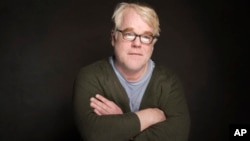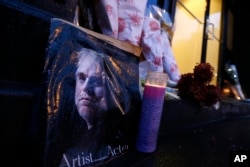NEW YORK —
Authorities were conducting an autopsy on the body of acclaimed stage and film actor Philip Seymour Hoffman, who was found dead in his Manhattan apartment on Sunday of an apparent drug overdose, an official said on Monday.
Hoffman, considered by many to be one of the finest actors of his generation, was discovered in the bathroom of his Greenwich Village apartment with a syringe in his arm.
"We're conducting the examination in the cause of the manner of death," said Julia Bolcer, spokeswoman for the New York City Medical Examiner. She added that she was not sure when the results would be available.
One big question in the 46-year-old actor's sudden death: why a talented man at a seemingly good point in his career apparently returned to the drugs that had plagued him in his youth.
New York City police sources familiar with the investigation said 50 small bags of what appeared to be heroin were found in Hoffman's apartment. Authorities found other drugs, including a medication for high blood pressure that is also used for treating opiate withdrawal, the sources said.
Police were trying to determine the source of the substance that apparently killed Hoffman and whether it was a deadly strain of heroin laced with fentanyl, a powerful synthetic opiate more potent than morphine, sources said.
Erin Mulvey, a spokeswoman for the New York office of the Drug Enforcement Administration (DEA), confirmed there has been "a rash of heroin ODs in the Northeast" recently tied to the strain.
The autopsy could explain how Hoffman apparently died soon after injecting what seemed to be heroin. But the why was another matter.
Although Hoffman was believed to have been sober for more than 20 years, Larissa Mooney, a physician and psychiatry professor at the University of California, Los Angeles, said addiction is a chronic brain disease.
"People, places and things that remind somebody of using can take a powerful hold and lead users to relapse even after treatment," Mooney said.
Tributes to Hoffman continued pouring in. Marquees of Broadway theaters in New York will be dimmed on Wednesday night for one minute in memory of the actor.
"He was a fixture in the neighborhood. It's heartbreaking," said a tearful Tara Driver, an art education student who lived near Hoffman's home in the West Village, part of Greenwich Village.
Struggle With Drugs
The death of Hoffman, who won the best actor Oscar for his role in the 2005 biographical film "Capote," raised new concerns about drug addiction in the entertainment industry.
If a heroin overdose is confirmed, Hoffman will join the list of entertainers who have succumbed to drugs in the last decade.
"Glee" actor Cory Monteith, 31, died of an accidental overdose of heroin and alcohol in October in Vancouver. Drugs were also the cause of death of Australian actor Heath Ledger in 2008 and singer Whitney Houston in 2012.
In decades past, overdoses from legal or illegal drugs have claimed the lives of entertainers, including Marilyn Monroe, John Belushi, Jimi Hendrix and Janis Joplin.
Hoffman spoke in the past of struggling with drugs, including a 2006 interview in which he told CBS he had at times abused "anything I could get my hands on. I liked it all."
Dr. Joseph Haraszti, a California-based addiction expert, said Hoffman appeared to suffer for his profession.
"He also mentioned that acting for him was a very difficult process," Haraszti said. "He would always take on the most difficult roles but it took a lot out of him."
John Tsilimparis, a psychotherapist in Los Angeles, said fame, fortune and the pressure to perform and maintain an image can be a lethal combination.
"In most occupations there are consequences for drug use, people lose their jobs and livelihoods. But with celebrities there is very little forfeiture of career and money when you have an addiction. There is less accountability," he said.
'Boundless and Profound Talent'
Hoffman's family issued a statement on Sunday saying they were devastated by his death. He is survived by three children and his longtime partner Mimi O'Donnell.
Born in upstate New York near Rochester, the actor appeared on stage and in films often portraying characters with innate intelligence and logical minds driven by underlying passion.
In addition to his Academy Award Hoffman also received three Oscar nominations as best supporting actor, for "The Master" in 2013, "Doubt" in 2009 and "Charlie Wilson's War" in 2008. He also appeared in blockbusters such as "Twister" and was working on the final installment of "The Hunger Games." But he was more often associated with the independent films such as "Happiness," in which he played an obscene phone caller, and "Before the Devil Knows You're Dead."
Hoffman earned Tony award nominations for his role as the main character Willy Loman in "Death of a Salesman," and for his parts in "Long Day's Journey Into Night" and "True West."
"We'll always be grateful for his boundless and profound talent that he shared with us on the Broadway stage," said Charlotte St. Martin, executive director of the Broadway League.
Hoffman appeared last month at the Sundance Film Festival in Utah for the premiere of the film "A Most Wanted Man," in which he played German spy Gunther Bachmann. He was also set to star in a 10-episode dark comedy for cable TV channel Showtime.
Hoffman, considered by many to be one of the finest actors of his generation, was discovered in the bathroom of his Greenwich Village apartment with a syringe in his arm.
"We're conducting the examination in the cause of the manner of death," said Julia Bolcer, spokeswoman for the New York City Medical Examiner. She added that she was not sure when the results would be available.
One big question in the 46-year-old actor's sudden death: why a talented man at a seemingly good point in his career apparently returned to the drugs that had plagued him in his youth.
New York City police sources familiar with the investigation said 50 small bags of what appeared to be heroin were found in Hoffman's apartment. Authorities found other drugs, including a medication for high blood pressure that is also used for treating opiate withdrawal, the sources said.
Police were trying to determine the source of the substance that apparently killed Hoffman and whether it was a deadly strain of heroin laced with fentanyl, a powerful synthetic opiate more potent than morphine, sources said.
Erin Mulvey, a spokeswoman for the New York office of the Drug Enforcement Administration (DEA), confirmed there has been "a rash of heroin ODs in the Northeast" recently tied to the strain.
The autopsy could explain how Hoffman apparently died soon after injecting what seemed to be heroin. But the why was another matter.
Although Hoffman was believed to have been sober for more than 20 years, Larissa Mooney, a physician and psychiatry professor at the University of California, Los Angeles, said addiction is a chronic brain disease.
"People, places and things that remind somebody of using can take a powerful hold and lead users to relapse even after treatment," Mooney said.
Tributes to Hoffman continued pouring in. Marquees of Broadway theaters in New York will be dimmed on Wednesday night for one minute in memory of the actor.
"He was a fixture in the neighborhood. It's heartbreaking," said a tearful Tara Driver, an art education student who lived near Hoffman's home in the West Village, part of Greenwich Village.
Struggle With Drugs
The death of Hoffman, who won the best actor Oscar for his role in the 2005 biographical film "Capote," raised new concerns about drug addiction in the entertainment industry.
If a heroin overdose is confirmed, Hoffman will join the list of entertainers who have succumbed to drugs in the last decade.
"Glee" actor Cory Monteith, 31, died of an accidental overdose of heroin and alcohol in October in Vancouver. Drugs were also the cause of death of Australian actor Heath Ledger in 2008 and singer Whitney Houston in 2012.
In decades past, overdoses from legal or illegal drugs have claimed the lives of entertainers, including Marilyn Monroe, John Belushi, Jimi Hendrix and Janis Joplin.
Hoffman spoke in the past of struggling with drugs, including a 2006 interview in which he told CBS he had at times abused "anything I could get my hands on. I liked it all."
Dr. Joseph Haraszti, a California-based addiction expert, said Hoffman appeared to suffer for his profession.
"He also mentioned that acting for him was a very difficult process," Haraszti said. "He would always take on the most difficult roles but it took a lot out of him."
John Tsilimparis, a psychotherapist in Los Angeles, said fame, fortune and the pressure to perform and maintain an image can be a lethal combination.
"In most occupations there are consequences for drug use, people lose their jobs and livelihoods. But with celebrities there is very little forfeiture of career and money when you have an addiction. There is less accountability," he said.
'Boundless and Profound Talent'
Hoffman's family issued a statement on Sunday saying they were devastated by his death. He is survived by three children and his longtime partner Mimi O'Donnell.
Born in upstate New York near Rochester, the actor appeared on stage and in films often portraying characters with innate intelligence and logical minds driven by underlying passion.
In addition to his Academy Award Hoffman also received three Oscar nominations as best supporting actor, for "The Master" in 2013, "Doubt" in 2009 and "Charlie Wilson's War" in 2008. He also appeared in blockbusters such as "Twister" and was working on the final installment of "The Hunger Games." But he was more often associated with the independent films such as "Happiness," in which he played an obscene phone caller, and "Before the Devil Knows You're Dead."
Hoffman earned Tony award nominations for his role as the main character Willy Loman in "Death of a Salesman," and for his parts in "Long Day's Journey Into Night" and "True West."
"We'll always be grateful for his boundless and profound talent that he shared with us on the Broadway stage," said Charlotte St. Martin, executive director of the Broadway League.
Hoffman appeared last month at the Sundance Film Festival in Utah for the premiere of the film "A Most Wanted Man," in which he played German spy Gunther Bachmann. He was also set to star in a 10-episode dark comedy for cable TV channel Showtime.







